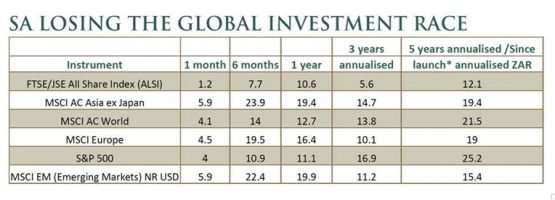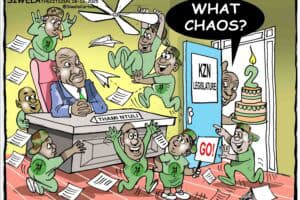Stone last.

Over 1 month, six months, one year, three years and even five years. In rand as well as US dollars. Against the developed world and now also against the emerging market world. Take your pick; it doesn’t matter.
These are the current facts of the returns of the Johannesburg Stock Exchange relative to the major investment groupings we would like to compare ourselves to.
Let me say it again: stone last!
Have a look at the below table and make up your own mind whether this is clickbait or financial pornography. These returns are in rands but the returns in US dollars gives exactly the same outcome. Stone last over each and every investment period.

This article is not meant to titillate or excite you. It’s meant to provide you with facts concerning your money and your future money. And please don’t say you haven’t been warned.
And if it means another barrage of “if-you-don’t-like-it-you-can-bugger-off” emails, then so be it. The facts speak for themselves.
What we are witnessing and experiencing is the true financial costs of Hurricane Jacob and his cronies within the ANC on each and every South African whose wealth is tied up in investments on the Johannesburg Stock Exchange. The rich, while also being affected have at least the ability to externalise some of their assets by means of offshore investments. It’s the middle-class and the poor particularly who don’t have this luxury and who have most of their personal wealth tied up in retirement funds linked to the JSE, with only an allowance to externalise 25% of their assets.
We are witnessing a slow and relentless collapse of relative investment performance, much along the lines of the collapse of the standard of our national rugby team. Like the Springboks, whitewashed 57-0 by the all-conquering All Blacks in Albany more than a week ago, our relative (and real) investment returns are being demolished by a decade of economic mismanagement, a collapse in law and order and wholesale looting of the state coffers.
And what adds to this tragedy, is that most investors are oblivious to what is being done to them and their future wealth. They simply don’t know or understand how dire the situation is. Certain parts of the media, I find, are very reluctant to publish articles along these lines, instead preferring to publish sunshine articles about the “JSE at record levels” and “now is the time buy” as the paid-for articles on many websites keep on exhorting the masses.
Almost every day I get an email from my bank urging me to buy shares on the JSE using their investment platform. The latest one is that all I need to do is pay some money across and the shares will be bought and sold by a team of experts.
Only problem is: the JSE is the world’s worst-performing major stock exchange at the moment. Oops.
It’s like the Ford Motor Co advertising a special deal on its Kuga model. Did they mention that they kind of catch fire for no rhyme or reason?
Ah, they would say: “But wasn’t the JSE the best-performing stock exchange over the past 100 years?”*. It’s like saying the Springboks are the best rugby team in the world due to the fact that they won the Rugby World Cup in 1995 and 2007. Egypt has also now replaced SA as the investment country of choice in Africa, according to RMB, another signpost of our relative decline in the eyes if the world.
Law and order
Several years ago I attended a lecture on investments by the late Dr Simon Marais, in life chairman of Allan Gray Investment Managers and one of the most successful investment fund managers ever in South Africa.
When asked what he looks for (globally) as the most important prerequisite for long-term investment success: he said: “law and order”.
Not return on equity, price-to-book, cash flow or any other financial ratio commonly used by fund managers, but law and order, plain and simple. To which I can add good governance, either state or corporate.
You cannot expect the private sector, especially companies listed on the JSE, to flourish and produce inflation-beating earnings and dividends in such an environment, as some people, advisors and columnists seem to think. Listed companies, more so than private companies, operate in an increasingly toxic business environment. And a reading of a swathe of company annual reports and financial statements underlines just how severe the situation is.
Business confidence is now back to levels last seen in 1985 when former president PW Botha was busy ruining the country.
The appointment of Jacob Zuma as president of the ANC and country ten years ago has been nothing short of a disaster. A human wrecking ball, as columnist Max du Preez aptly described him. No longer is there any doubt about which one of the roads we as a country are on. At first, during the Mandela period, there was a real and enduring chance that SA could be on the High Road as foreseen by scenario planner Clem Sunter.
Instead, we are firmly on the Low Road which is characterised by rising unemployment, theft and looting of state coffers, rising crime and social unrest and a widespread collapse of infrastructure (water, sanitation, roads and electricity) in major swathes of our country. I often travel to the smaller cities and larger dorpies in our countryside, meeting with business people and farmers, and hear first-hand the conditions under which they operate their businesses and enterprises.
Our economic growth rate over this period of time (2007-2017) has been almost 2 percentage points below the longer-term average which, apart from the obvious loss in potential employment for a country with a rising population, has also led to a steady deterioration in the key national financial metrics, such as debt to GDP, interest cost as well as tax buoyancy.
The result of 10 years of economic sabotage and disastrous economic policies are now playing out in front of our eyes on TV and in the media. The collapse in revenue collection — a budget shortfall of between R40-R50 billion for the current fiscal year — are but superficial signs of the financial rot that has set in.
The next target for state capture in its most brutal format is the trillions of rands being managed by the Public Investment Commissioner on behalf of its clients, mostly the Government Pension Fund (GEPF). And thereafter, I’m sure, will be the private sector pension funds.
As Jesse James, infamous bank robber in the US wild west once said when asked why he robs banks: “Because that’s where the money is”.
Run out of easy money
As a country we have now run out of the easy money. The easy money was the yearly increase in tax collections which always seemed to match or even exceed budget figures. Those days are gone. The global commodity cycle — which generated super-duper profits for our mines from 2002 to 2008 — is now over, perhaps for a very long time.
For the past number of years Treasury, alongside our private sector economists, have been over-optimistic as far as economic growth rates were concerned.
Each year initial forecasts are toned down or trimmed as the year unfolded. This year’s forecast of 1.3% growth in February was almost immediately slashed in half by the IMF, World Bank, Goldman Sachs and almost anyone who digs a little deeper into the numbers. A growth rate of anything between 0% and 0.6% seems to be on the cards for this fiscal year. Whatever it is, it will still mean a sharp decline in the GDP per capita for the country as whole. In other words a country getting poorer.
And have you noticed, dear reader, that I haven’t even mentioned the residential property market? Have you tried selling a house recently?
Would I prefer to remain quiet about these unfolding events? Absolutely! But what would you prefer, dear reader? A marketing-driven, sanitised version or a brutally honest assessment of the unfolding financial catastrophe caused by Hurricane Zuma?
Brought to you by Moneyweb






